Over 100 far-right candidates stood in this year's elections: Could they become a political force?
ON SUNDAY NIGHT, figures from Ireland’s far-right movement gathered in Dublin to toast the election of two new politicians on to the city’s local authority.
Gavin Pepper and Malachy Steenson, both influential in different anti-migrant protests in the capital, are set to take their seats on Dublin City Council in the coming weeks after 18 months of noise around immigration in Ireland reached a crescendo last weekend.
Hours after their electoral success, the pair sat behind an Erin Go Bragh flag and a table of pints, flanking Irish Freedom Party leader Hermann Kelly as they posed for a photo which the latter would subsequently share on X.
“Sometimes it’s good just to celebrate and have a laugh,” Kelly captioned the image.
For Kelly, however, there seemed little cause for celebration; his brothers-in-arms performance and the attempt to bask in the limelight of Pepper and Steenson’s victories masked the contrasting electoral fortunes of all three men.
Steenson and Pepper, who ran as local independents, proved successful at tapping into concerns over immigration within their communities, and it was clear that both looked likely to win seats on Dublin City Council as early counts came in on Saturday evening.
The Irish Freedom Party returned just one councillor across 20 local authorities; 29 of its candidates failed to win a seat and in the majority of cases never looked like being in the race.
It was indicative of the wider story of the far-right vote in the local elections, where a focus on immigration was successfully hoovered up by independents.
But despite winning just five out of the 949 local authority seats available this time, there are green shoots for the movement in Ireland.
Far-right views have gained a foothold in Irish political discourse and if its disparate factions can work together, there is evidence that they can flourish in future.
There have already been indications of far-right growth in recent years, particularly given the number of candidates who stood for election this year.
The Journal counted more than 100 people who ran on a far-right platform in the local elections – almost three times the number of those who ran in the 2020 general election.
They included candidates from the five registered far-right parties – Kelly’s Irish Freedom Party, the National Party, the Farmers’ Alliance, Ireland First, and The Irish People – as well as a handful of independents, many of whom have a strong social media following.
Out of the more than 150 who put themselves forward, five candidates were ultimately elected: Steenson and Pepper for Dublin City Council; Glen Moore of the Irish Freedom Party, who ran for South Dublin County Council; Patrick Quinlan of the National Party, who stood in Fingal; and independent Tom McDonnell in Kildare.
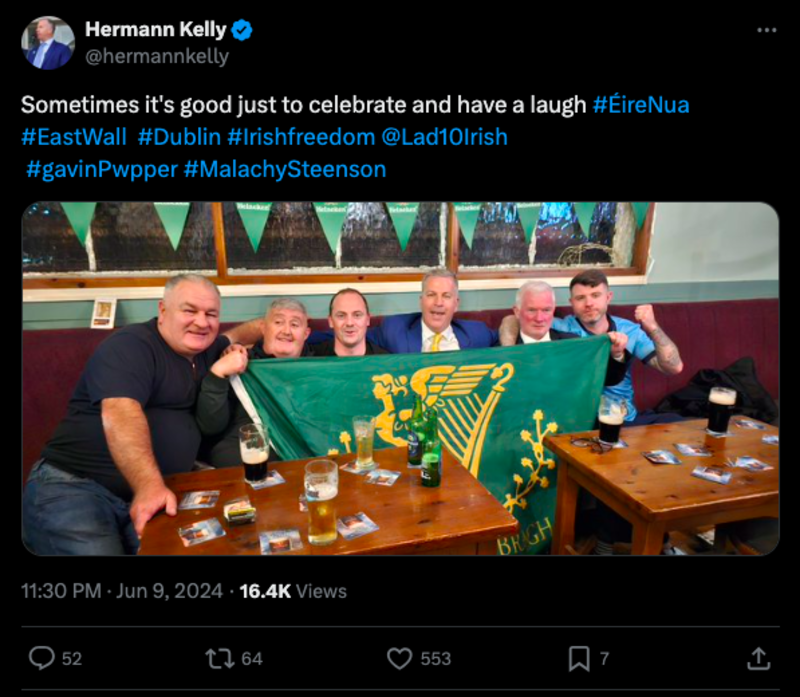
Hermann Kelly celebrating with Steenson second from right and Pepper fourth from right on Sunday
Although they occupied a similar space to other candidates who aired anti-immigrant views – particularly some rural independents – far-right candidates were distinguishable by their more extreme brand of politics.
Rather than simply questioning Government policies on immigration, far-right figures use arguments that are unashamedly racist and littered with conspiratorial thinking and misinformation.
This stems from a foundation of ethnonationalism – a belief that nationality is defined by one’s ethnicity – which argues that Ireland’s social fabric is being degraded simply by immigration and the presence of non-white people.
Independent candidate Fergus Power, who was named in the Dáil last year as being among those who spread rumours that “incited” the Dublin riots, is one of those who has built a significant social media following based on such extreme views.
Last year, he posted an image from Dun Laoghaire (where he stood as a local candidate) alongside the caption “Say it loud, say it clear: keep those filthy undocumented economic migrants, possible murderers and potential rapists [...] away from here”.
Derek Blighe, the leader of Ireland First who stood as a local candidate in Fermoy and for a European seat in Ireland South, encouraged people to vote earlier this month by claiming “foreign rapists are avoiding deportation by applying for asylum in Ireland”.
The National Party’s website states that it supports “the ending of all mass immigration into Ireland” while The Irish People similarly claims that the current Government is “destroying Ireland” with policies including “open borders” and “globalist agendas”.
Unlike many of those who protested against asylum accommodation, far-right candidates and parties also campaigned on their extremely conservative views on women, LGBT issues and Islam, which they likewise held up as evidence of Ireland’s ongoing decline.
Tom McDonnell, who won a seat on Kildare County Council as an independent in Newbridge, referenced the Irish birth rate when he spoke to the media afterwards, saying: “If we don’t have women breeding, we die out as a breed.”
Philip Dwyer, another candidate for Ireland First who promotes conspiracies on social media, claimed in an interview earlier this year that Muslims from the Middle East were behind violent crimes that were apparently never seen in Ireland before their arrival.
Such claims draw a clear line between politicians who have sought to harness local disquiet about asylum accommodation and convert it into votes, and far-right figures who regularly share conspiracy theories or express fringe political views.
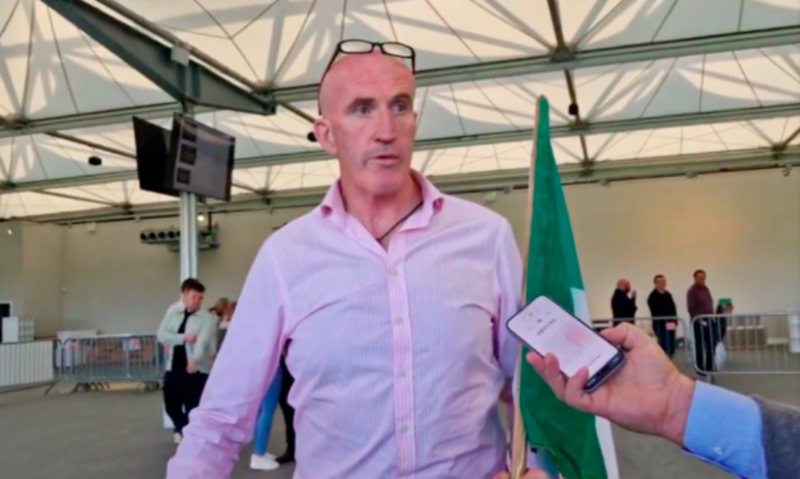
Tom McDonnell who was elected in Newbridge on Wednesday
Bigger picture
The sheer number of far-right candidates who ran suggested a confidence within the movement that the public was open to its message, or that its personalities are well-placed to fill the space of conservative populism in Irish politics.
As evidenced by Kelly’s “celebration”, the election of five far-right councillors has only fed this confidence and bolstered self-belief within the movement that it is going places.
“I’ve said it many times, it will start in the big cities and spread everywhere,” Derek Blighe, the leader of Ireland First, remarked after the election of Pepper and Steenson in Dublin.
Their momentum may be somewhat dampened by their losses to more moderate independents, who were able to capitalise by operating in a similar space on issues like immigration or anti-Green issues without being as extreme in their approach.
But it is still clear that last weekend’s results marked a watershed moment for the far-right in Ireland.
Aside from the actual success of far-right candidates, there was a general uptick in support for far-right candidates compared to previous years.
In the last general election, the best-performing far-right candidate managed just 2% of first preference votes and none were elected; this time, more than 70 people received at least 2%, even in areas where they didn’t get voted in.
Despite the poor performance of party candidates overall, most of those 70 stood for one of the five registered far-right parties.
This may be in part due to the type of candidate who is being chosen for the parties, as much as it is to do with their policies.
The success of Moore and Quinlan marked the first time that candidates standing for the Irish Freedom Party or National Party were elected since they were founded last decade.
Moore, a young activist who says he only joined the party last year, claims to have gotten involved in politics after witnessing violent crime in Dublin.
Staying on message, he has made passing reference to the Great Replacement (a conspiracy theory which claims that white people in the West are being replaced by migrants) in discussions about immigration in Ireland.
But he typifies a broader journey by the Irish Freedom Party in recent years; its candidates are no longer a band of celebrity conspiracy theorists and anti-EU rabble rousers like Ben Gilroy and Dolores Cahill, but a group of younger unknowns whose views are less well-known.

Glen Moore of the Irish Freedom Party
Quinlan is a similar figure for the National Party.
Its two most prominent candidates in the 2020 election, disputed leader Justin Barrett and Philip Dwyer, did not run locally for the party this time around after being thrown out (in the case of Dwyer) or being sidelined amid an ongoing leadership dispute (in Barrett’s case).
This time, its 12 local candidates were fresh faces without the baggage of social media infamy who look to the future as much as to the past.
“We are inevitable, nationalism is the future in Ireland – and rightly so,” he said after his election victory on Sunday.
“It’s a David versus Goliath situation, and David is loading his slingshot getting ready to take down this regime.”
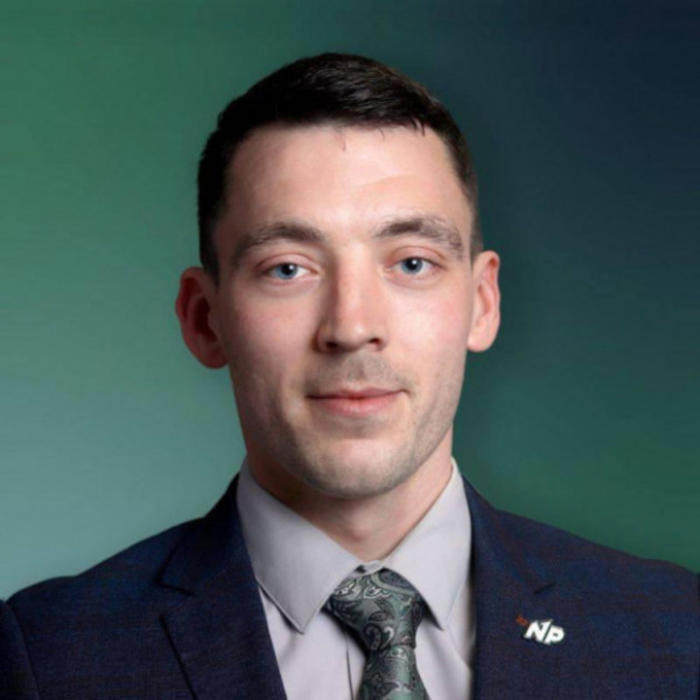
The National Party's Patrick Quinlan
Independents
But the suggestion that the far-right parties could upend Ireland’s political establishment is scarcely credible if their broader election results are anything to go by.
Despite their respective successes, Moore and Quinlan were stark outliers as far-right candidates who were seemingly elected despite being party politicians, rather than because of it.
The day after he was pictured celebrating with Steenson and Pepper, Kelly told reporters at the Midlands North West European count in Castlebar that the Irish electorate was generally moving towards an “economically liberal, socially conservative, nationalism”.
But it is a damning indictment of their cause that in a political landscape where a clear space for nationalist, populist conservatism exists, the five far-right parties are barely making an impact.
The Irish Freedom Party and the National Party may have surmounted the hurdle of 2% in first preference votes, but only four of the Irish Freedom Party’s 30 candidates managed to get more than 5%, while only two of 12 National Party candidates did the same.
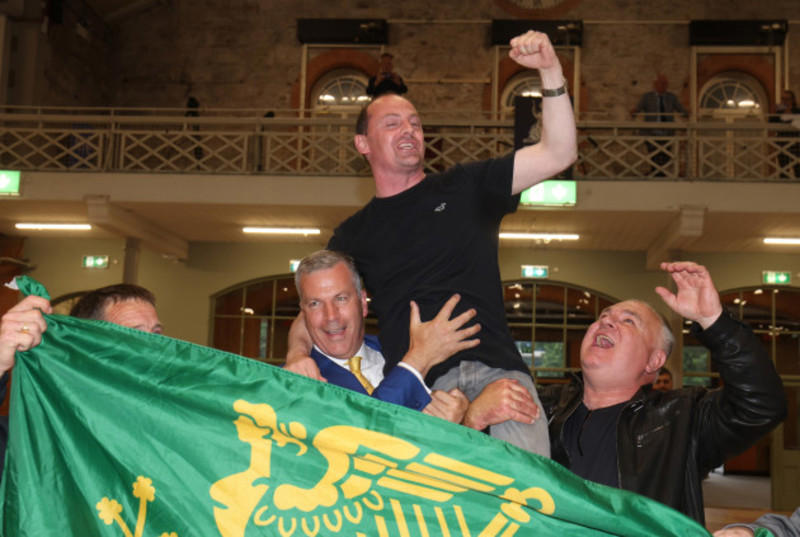
Gavin Pepper is hoisted high by Hermann Kelly left leader of the Irish Freedom Party after he is elected
As seen elsewhere in the elections, it was instead the smattering of independents who were better-placed to capitalise, whether it was through brand recognition like Pepper or the local familiarity of characters like Steenson and Kildare’s Tom McDonnell.
The social media presence and involvement of some independents in anti-immigrant protests or local movements against asylum seeker accommodation ultimately helped propel them to strong electoral performances.
Pepper, a taxi driver, is best known as an anti-immigration agitator active in the Finglas area, who has become prominent on far-right social media in recent years.
He regularly posts videos about immigration and asylum seekers to X, and has been seen at different anti-immigrant protests across the country.
Steenson, a local solicitor who is well-known in East Wall, likewise acted as a spokesperson for anti-immigrant protesters during Ireland’s first major anti-asylum accommodation protests in late 2022.
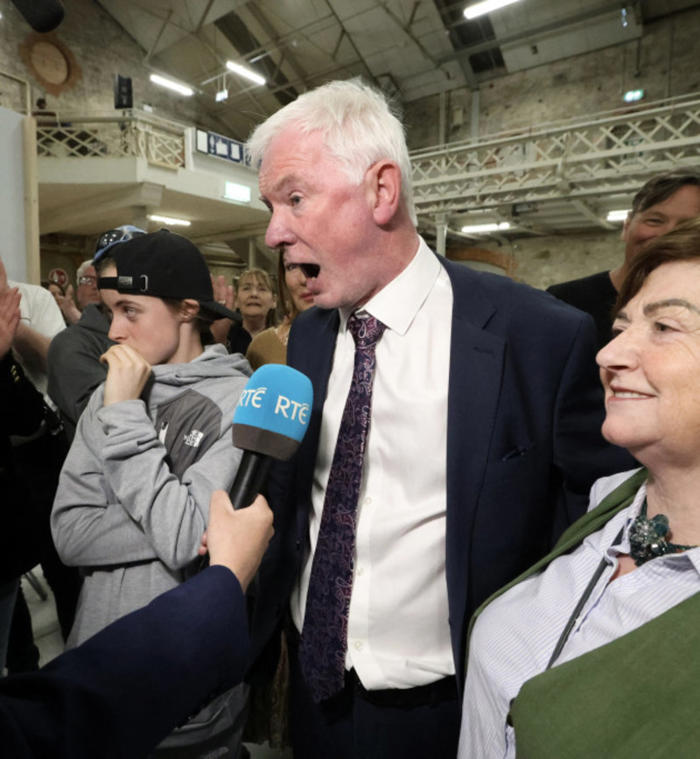
Malachy Steenson speaking to the media after his election on Sunday
The phenomenon was not just limited to independents who managed to get elected.
In Kerry, Michelle Keane achieved 10.2% of first preference votes before narrowly missing out on the fourth and final seat in Castleisland.
She has previously campaigned in her community against the installation of a mast, and has more recently been involved in protests against asylum seeker accommodation in Tralee.
Kevin Coyle, who stood in Artane-Whitehall and has become prominent in anti-immigrant protests in Coolock, also looked set to take a seat on Dublin City Council before a dearth of transfers put paid to his chances on Sunday afternoon.
Their more grassroots-style campaigns, free from the distance that is created from being a party candidate, gave them a significant advantage over non-independents, who lacked the same recognition or association with the wider anti-immigrant movement in Ireland.
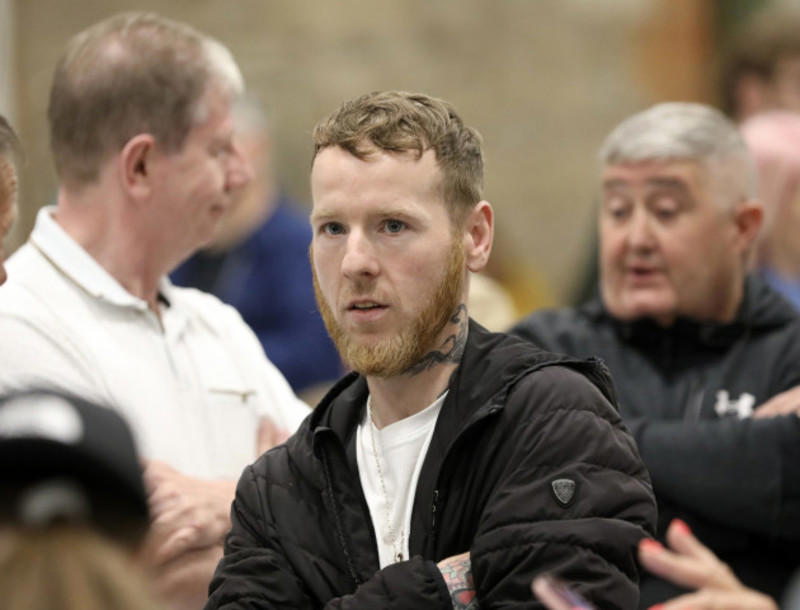
Kevin Coyle during counts for the local elections at the RDS Dublin
The social media effect can even be seen in far-right candidates from newer parties, like Ireland First leader Derek Blighe and The Irish People’s Ross Lahive.
Blighe won 5.5% first preferences in Fermoy and looked at times like he would win a local authority seat, while Lahive got 6% of first preferences in Cork city and similarly threatened to take a council seat before falling away on Sunday.
Both men have, like successful independents, built up large followings on social media as a result of attending protests around the country, to the point that their involvement with parties are secondary aspects of their candidacy.
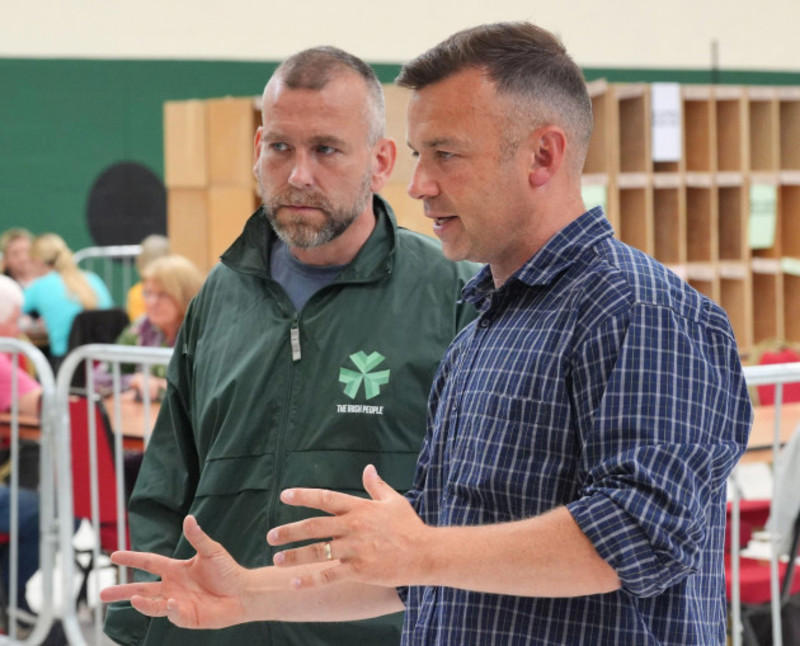
Derek Blighe right and Ross Lahive left in the Nemo Rangers count centre in Cork
Split vote
Given the success of far-right figures with outsized influence on social media, it is ironic that the movement’s reliance on personalities is also holding it back.
One factor in the overwhelming failure of far-right candidates last weekend was a bad electoral strategy that saw the vote split between its various parties and independents.
In the Dublin City Council area of Ballymun-Finglas, more than 20% of first preference votes were split between four far-right candidates, but Pepper was the only one elected.
Three others reached 16% between them in Fingal’s Blanchardstown-Mulhuddart – where the National Party’s Patrick Quinlan was likewise the only one to cross the line.
Had there been fewer far-right candidates running against each other in many areas, it’s likely that they could have doubled their number.
That reality is already being acknowledged by members of the movement, who may consider a more tactical approach in the general election, which is due to take place within the next nine months.
“Overall, I think we made huge progress,” Philip Dwyer of Ireland First, who stood unsuccessfully in Tallaght Central, said in a video shared to social media on Monday.
“The only regret is this nationalist split vote, which we all have to take cognisance of for the next election, which could be coming up very quickly.”
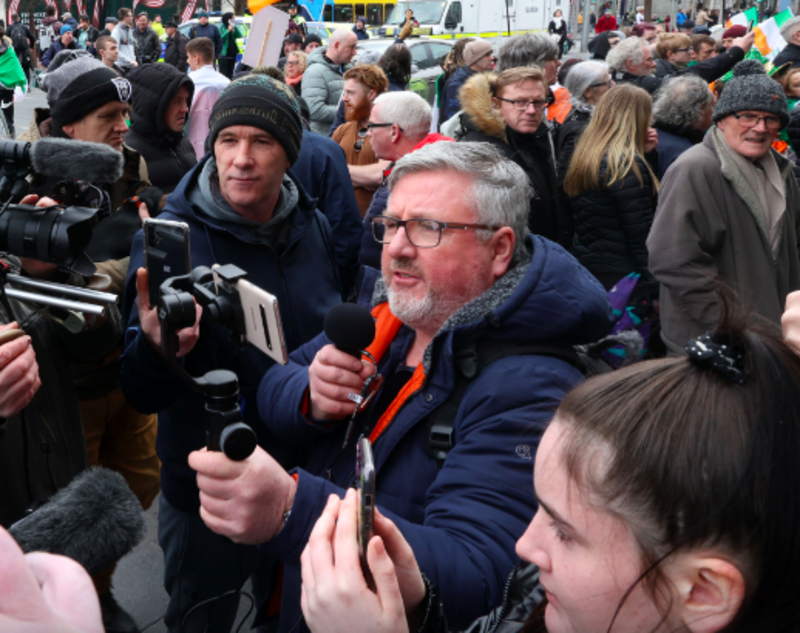
Philip Dwyer centre during a protest in Dublin city centre
Whether the different far-right parties and various independents can put this into practice is another matter: one has to ask, who would lead them and how would they devise their electoral strategy?
The mere fact that five parties have formed in less than a decade – three of them in the past twelve months – suggests that the movement is splintering rather than moving together.
And their actions don’t seem to suggest that cohesion is coming down the line any time soon.
In January, Blighe posted on X that Ireland First would not be running candidates in the European elections and that it would instead endorse its “partners” in the Irish Freedom Party.
In the end, Blighe ran as a candidate for Ireland South against the Irish Freedom Party’s Michael Leahy, while Philip Dwyer ran in Dublin against Diarmaid O’Conorain.
The Irish People, meanwhile, has committed to running candidates as independents under its brand, while the National Party is involved in an ongoing leadership dispute that led to James Reynolds and Justin Barrett – who each claim to be its rightful leader – run against each other in the European elections in Midlands North West.
Perhaps such factionalism is the logical result of a political movement built on social media, where personalities – rather than ideas – are the main draw: everyone longs to be the star, but nobody is prepared to play a supporting role.
Hermann Kelly’s post-election photo with Steenson and Pepper seems more deliberate in that light; it could be the closest he comes to glory until the far-right sheds its ego problem.
